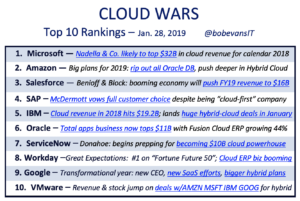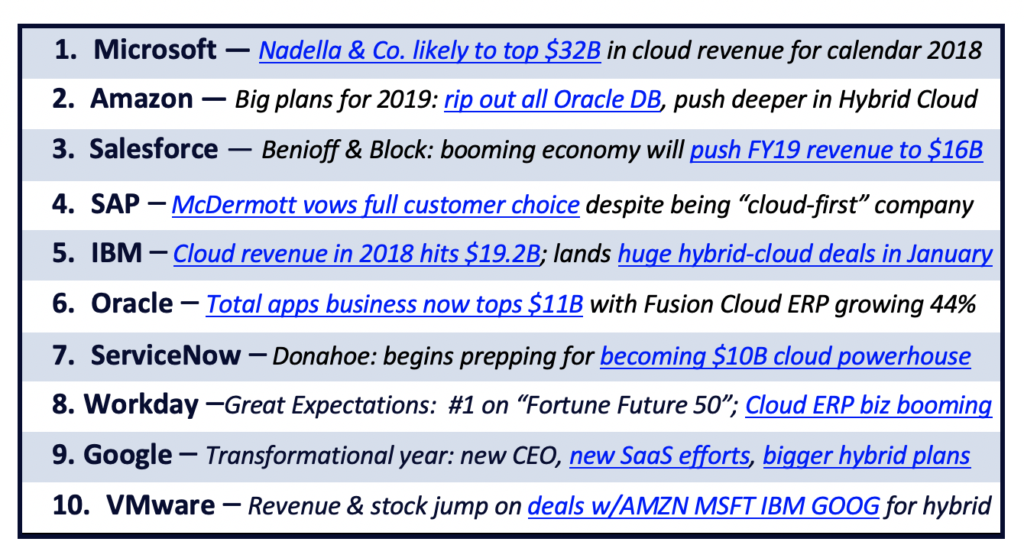While Amazon remains the undisputed king of public cloud IaaS, Microsoft’s broader set of across-the-cloud services pushed Microsoft’s commercial-cloud revenue for 2018 to $32.2 billion and have given it an insurmountable lead as the world’s largest cloud provider over Amazon, whose numbers come out tomorrow.
To match the Microsoft 2018 cloud revenue total of $32.2 billion for calendar 2018, Amazon’s AWS cloud unit would have to triple its year-ago Q4 revenue of $5.11 billion—and that’s simply beyond the realm of possibility, regardless of how powerful the Amazon and AWS brands have become in the marketplace and how successful their efforts have been.
A more likely scenario when Amazon posts its Q4 and full-year results tomorrow will be AWS revenue growth of about 45%, which would make its current Q4 revenue $7.41 billion and give it a calendar-2018 total of $25.6 billion.
Within the Microsoft results, a couple of quick numbers: Azure growth was up 76%, the same as in the previous quarter ending Sept. 30; total commercial-cloud revenue for the latest quarter hit $9.0 billion, up 48%, which was one point higher than the 47% growth rate reported in the previous quarter; and 51% revenue growth in SaaS for Dynamics 365, the same growth rate as in the previous three months.
So why do these very big numbers from Microsoft and Amazon matter? Well, other than giving me a chance to chirp about my prediction 8 weeks ago that the Microsoft 2018 cloud revenue total for the year would come in at $32.3 billion, the numbers truly matter because they underscore a few fundamental points:
- the enterprise cloud continues to demonstrate that it is and will continue to be one of the biggest growth markets the tech industry has ever experienced;
- business across all industries and around the world are moving aggressively to the cloud as they seek to accelerate innovation, create new engagement models with customers, enhance customer experiences, and become end-to-end digital businesses;
- the core foundation for a global digital economy is being built around the enterprise cloud;
- Microsoft and Amazon, while offering significantly different cloud services to customers, continue to drive business value for their cloud customers and relentless innovation from not only those two market leaders but also every cloud vendor; and
- contrary to the enormous number of media reports stating that Amazon is the “runaway leader” in the cloud, the numbers show—conclusively and objectively—that Microsoft is the world’s largest and most-influential enterprise-cloud vendor.

For Microsoft, the power of a full range of cloud computing services is becoming increasingly relevant because, as CEO Satya Nadella said yesterday in the Q&A portion of Microsoft’s earnings call, “every company is becoming a digital company.”
And to successfully undertake and complete that transformation, those companies need to address and overhaul everything they do—from how they find, hire and groom great talent; to how they design, build and market dynamic new products; to how they close financial books more quickly to allow them to allocate resources more intelligently and productively; to how they engage with customers in ways that are driven by the buyers instead of the sellers; and how they become creators of software code rather than just purchasers of it.
Microsoft’s deep expertise across not only IaaS—the portion of the cloud that Amazon essentially created and in which it has performed so brilliantly—but also the higher-value categories of PaaS and SaaS plus edge computing, AI and IoT gives customers a full set of tools, knowledge and capabilities to address most of those challenges in a unified fashion.
Over the next day or two, we’ll dig a little more deeply into the details of the Microsoft 2018 cloud revenue numbers and those posted by AWS, but I felt it was vital today to address how these two remarkable companies continue to power a revolution in not only cloud technology but also in the world of business.
Subscribe to the Cloud Wars Newsletter for twice-monthly in-depth analysis of the major cloud vendors from the perspective of business customers. It’s free, it’s exclusive, and it’s great!
*******************
RECOMMENDED READING FROM CLOUD WARS:
The World’s Top 5 Cloud-Computing Suppliers: #1 Microsoft, #2 Amazon, #3 Salesforce, #4 SAP, #5 IBM
Amazon Versus Oracle: The Battle for Cloud Database Leadership
As Amazon Battles with Retailers, Microsoft Leads Them into the Cloud
Why Microsoft Is #1 in the Cloud: 10 Key Insights
SAP’s Stunning Transformation: Qualtrics Already “Crown Jewel of Company”
Watch Out, Microsoft and Amazon: Google Cloud CEO Thomas Kurian Plans To Be #1
The Coming Hybrid Wave: Where Do Microsoft, IBM and Amazon Stand? (Part 1 of 2)
Oracle, SAP and Workday Driving Red-Hot Cloud ERP Growth Into 2019
*********************









